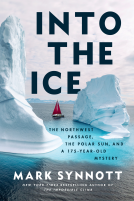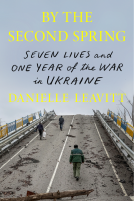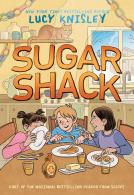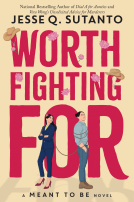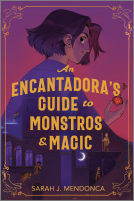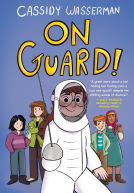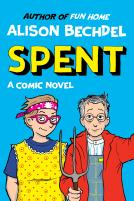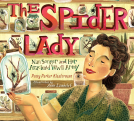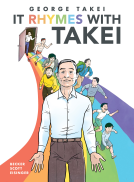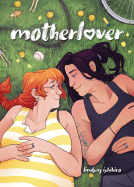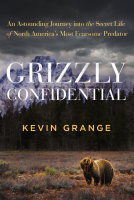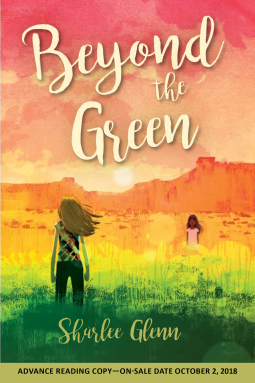
Beyond the Green
by Sharlee Glenn
This title was previously available on NetGalley and is now archived.
Send NetGalley books directly to your Kindle or Kindle app
1
To read on a Kindle or Kindle app, please add kindle@netgalley.com as an approved email address to receive files in your Amazon account. Click here for step-by-step instructions.
2
Also find your Kindle email address within your Amazon account, and enter it here.
Pub Date Oct 02 2018 | Archive Date Jul 19 2018
Description
Eleven-year-old Britta's big Mormon family took in little Dori--a member of the Ute tribe--as a baby. Now, four years later, Dori's birth mother, Irene, is ready to take Dori back. Blunt and feisty, Britta is filled with anger. How can Irene claim Dori when she's been gone all this time? Britta will stop at nothing to keep her sister, even if it means running away or failing to see beyond her prejudices.
Marketing Plan
-Feature in Charlesbridge newsletter
-Advertising based on reviews
-Social media promotion
-Feature in Charlesbridge newsletter
-Advertising based on reviews
Available Editions
| EDITION | Other Format |
| ISBN | 9781580897419 |
| PRICE | $16.99 (USD) |
Featured Reviews
There are far too many stories of white people saying indigenous children, giving them a better life.
Indigenous children do not need to be rescued.
I was worried, when I started to read this book, though the description hinted otherwise, that this book would be like that. That Britta kept devising plans to save her foster-care sister from returing to her birth mom made me worried that perhaps this wasn't the story I hoped it was.
I was pleasantly surprised.
Britta, a Mormon child, feels that Dori would be better off with her family who had had her for the first four years of her life. She can't imagine that the Indians could take as good care of her "sister" as her family did.
But, as all good books do, this one allowed Britta to grow and change, and see things from another point of view.
And her wise grandpa had a great quote:
<blockquote>Differ'nt don't necessirly mean worse, Britta-girl," he said. "Sometimes it means better. Sometimes it just means differ'nt. And thank goodness for differ'nt. Too much sameness would make for a might bland world."</blockquote>
The author made this all feel very real, and very special, probably because it is a fictionalized version of her own foster sister, that was returned to her birth mother.
Odd, every day elements make it very real.
Highly recommend this for school libraries, public libraries, and just for good old-fashioned reading.
Thanks to Netgalley for making this book available for an honest review.
 Barker J, Bookseller
Barker J, Bookseller
A beautiful, heartwarming story about the lengths families go to for each other, whether they're joined by blood or not. I loved the insight into Mormon life at the time, and the way our main character, Britta, grew and changed and came to realise that she needed to look at things from a different angle. I'm also glad no one was demonised over the course of the book; everyone had their chance to change for the better.
A lovely read, I'll be watching out for this author in future. Thank you netgalley and Charlesbridge for the chance to read it.
 Reviewer 247460
Reviewer 247460
When I finished this book I was pleasantly surprised that I really, really enjoyed it.
The story gave a soft 'Little House on the Prairie"-vibe for me because it was story narrated by a young protagonist in a setting from the past that incorporated real historical issues and drama, but told in a way that was easy to understand and flowed quite smoothly. I was even surprised when I read in the authors note that this book was based on the author's real life experience with her foster sister, which makes this all the more better and touching.
I also enjoyed the characters, even feisty Britta, who even I believe might've taken things too far at some points of the story (not just the running away part), but that's okay because she's still young and it adds to her character, which only continued to develop positively throughout the story. I also really enjoyed the family dynamic, from Britta's mother, her siblings (including little adorable Dori), and her awesome grandpa. It felt comfortably warm. Even the culture of the Ute tribe was great because it was introduced in such a way where it was easy to understand and was not overwhelming.
Overall, this was a very enjoyable read that had me shed a tear here and there.
I highly, highly recommend this book to anyone. :D
 Siusan B, Reviewer
Siusan B, Reviewer
Wow, this book is absolutely wonderful, loving, brave, and eye opening, with beautifully painted scenes of the mountains and farms as a backdrop. Beyond the Green, by Sharlee Glenn, tells the tale of a family giving up its most prized possession, their youngest child. The story, told through the eyes of the middle child, Britta, an eleven year old Mormon girl living on a family farm in the Uintah Basin, Utah in the late 1970s, centers on the youngest child, Dori, who has been living with the family since she was five months old and is now four. Her biological mother, Irene, member fo the Uintah tribe has gotten sober and wants her child back. Britta spends most of the book devising plans on how to keep Dori from Irene as well as trying to work through her feelings about doing what she knows is right and her prejudices about certain individuals. While Britta is a stereotypical eleven year old with stereotypical eleven year old farm girl problems (not wanting to do chores, annoying siblings) her life is anything but.
Sharlee Glenn has captured all the emotions of the story so well and the author’s note explains why. This book touches a lot of different themes that can help expose readers to new topics: multi-racial families, foster care, the Indian Child Welfare Act, farming communities, Mormonism, and stereotypes that existed and continue to exist about Native Americans. I strongly recommend Beyond the Green for both children and adults.
 Kay S, Reviewer
Kay S, Reviewer
This is a lovely book narrated by an innocent farm girl, who is part of a large, loving extended family. Her family fosters a young Ute girl who they love and dote upon. The main character and her family experience a variety of adventures during the summer but the main event they have to contend with is the reappearance of their foster baby's birth mother who wishes to reclaim her and thereby establish her cultural identity. Written with care and compassion the author leads one to reflect on the true meaning of family and what relationship bonds are truly unbreakable.
Sharlee Glenn’s poignant story Beyond the Green grabs the reader from the beginning. It stirs up emotions of loss, happiness and acceptance.
Set in the late 1970’s a Mormon family takes in a young Ute child after her mother is deemed unfit to care for her. Now four years later the mother has come back for her child and the Twitchell family is discovering that letting go of Dori or Chipeta (her birth name) will not be easy.
The story provokes sadness from the point of view of the young Twitchell sisters Britta and Cally and the desperation drives Britta and her emotions to make questionable decisions to keep Dori from leaving. Some decisions are bad almost cruel, some are good. And sometimes compromises as Britta learns may lead people down a new path that will benefit everyone involved. A nice middle grade story about accepting change.
 anindyta a, Reviewer
anindyta a, Reviewer
Got this ARC from Netgalley in exchange for honest review. This book tells a story about family in a prairie who raised a child of the Ute tribe named Dorinda for four whole years. All of a sudden, the girl’s birth mother wants her child back to her.
This book surprised me, in a good way. Of course, when I started this book, I’m kind of expecting the Little House on the Praire vibe, all the pleasant things about making cheese et cetera. But nope, this book is not like that. It’s not really about the life on the prairie. Eventhough there is a slight vibe to it (and I love that slight vibe), but the book is centered on the main issue. The book is about family, about letting go and doing what is right. The book is about love and I love it for that. It is surprising that this book could make me care so much to the characters. Not even the protagonist, but the so called antagonist. The author made me think about how in life there are many perspectives. And my favorite part is when the girls are running away to save Dorinda. It’s quite an adventure and pleasantly thrilling. And I enjoy it when they all go to Ute tribe festival, got to know a bit about Ute Tribe is a point plus for me.
Glad I found this book. This book is not a tearjerker for me, but it’s really touching. I really enjoyed this book. Thank you, Sharlee Glenn. Thank you.
 Librarian 459576
Librarian 459576
Very good story, well written. The story progressed nicely and the further I got in it the more I enjoyed it.
It is a sweet and touching story and didn't turn out as I expected.
 Julieth C, Reviewer
Julieth C, Reviewer
I want to start by saying that this is a rather quick read, it took me two days but only because I had to work in between reading. In the story we meet the family of the Twitchell's who foster a little baby girl to then have the birth mother ask for her back. I found this story to be so cute, it is based on a true life events, and it gives me all the feels. As a young little girl, Britta loves her little sister Dori and the thought of losing her has her doing little crazy things here and there, but at the end she learns that it was for the better and that her sister will be okay.
It is a touching story, filled with love and cute family moments. It is a middle grade book and I think it will be a good story for young readers, as it gives a good life lesson about love, family and acceptance.
 Caitlin H, Librarian
Caitlin H, Librarian
I started out annoyed at this book. It took me a while to see the care the author put into crafting this story to both honor her experience as a child and honor the complexity of the issues it touches on. I still want to read more books about indigenous Americans by indigenous Americans, but the story here is obviously written with care. The author admits she may not get everything right, but the author’s note at the end gives readers a sense of the how and why of the text.
I think this is a great selection for middle grades.
What does it mean to become (and stay) a family? For older readers, Far From the Tree would be a good “next book” after this.
 Michelle D, Reviewer
Michelle D, Reviewer
Set during the summer of 1979 in the Unitah Basin in Utah, Britta is about to have her world turned upside down. Four years ago, Britta's mother is asked to foster a baby that is found in the backseat of a car while it's mother is picked up for being intoxicated. The baby Chipeta, now known as Dorinda, has become the center of the Twitchell household and the little sister everyone adores. When Britta discovers that the Dorinda's mother Irene has cleaned up her act and wants her daughter back, she goes out of her way to keep Dorinda, better known as Dori, with the Twitchell's. Unfortunately for 12 year old Britta Twitchell, she has more than Irene to deal with. Set one year after the Indian Child Welfare Act, Britta's family is legally prohibited from adopting Dori. However, the journey the two families take is lead by more than the law. Prejudice, culture, religion, and mistrust are only a few of the hurdles standing in the way.
This story was beautifully told through the eyes of twelve year-old big sister who just wants to keep her family together. Watching how Britta discovers both the differences and similarities of her Mormon faith and the ways of the Ute Indians made for a compelling and engaging story.
 Kim C, Educator
Kim C, Educator
Beyond the Green is a novel that explores a very complex and controversial subject. The book does this in a way that brings the issue to life and allows the reader to see all sides. The issue here is the adoption of Native children by white families.
In this book, Britta is the older sister in a large family. The Twitchells live on a farm in Utah, on the Ute reservation. The land was divided up by the government and plots were sold to white farmers, even though the land was part of the reservation. The Twitchell family takes in a baby who is only a few months old. Her Ute mother was drinking and the child was taken from her. The baby’s name is Chipeta, but the foster family names her Dori, short for Dorinda. As Dori grows up, she just accepts that the Twitchells are her family. She was too young when they took her in to know.
When Dori is 4 years old, her birth mother, Irene, comes back and wants to have her child returned. Under the law, this is her right. Obviously, the family has become attached to Dori and thinks of her as their child. The two older sisters, Britta and Cally, are particularly close to Dori. It is a heartbreaking situation all around, as the two families both love the child and want what’s best for her. However, Britta and her family have a hard time coming to terms with the pending return of Dori to her birth mother.
The novel tackles an issue that is not only historical, but still happening today. The removal of Native children from their families and cultures contributes to the loss of their heritage. When a Native child is raised by a white family, the child does not learn the traditions, language, stories, dances, and other things that are part of his/her culture. Often, the children are placed with white families, even though there may be other Native relatives who could take them in. In this case, there is a grandmother who could have taken the child, but was ill and the child was instead given to the Twitchells. For the child and families involved, the movement back and forth between the two worlds can be quite traumatic. Dori is only 4 years old and it’s tough to explain something like that to one so young.
Britta and Cally respond as devoted sisters will. They try to “save” Dori by running away with her. Of course, they are young and woefully unprepared, so it doesn’t work out. That doesn’t stop the sisters. They keep coming up with different schemes that might allow them to keep Dori. They don’t think of Irene’s feelings in all this at first. Nor do they seem to be thinking of Dori’s future. They just don’t want to lose their little sister. Britta also thinks of Irene as a drunk, something which she picked up from some local boys who have an antagonistic relationship with an elder who lives near the Twitchells, Red Hawk. The boys tell Britta that the elder is a drunk and she believes them, until her grandfather helps her see that it is not true. Red Hawk is a traumatized war veteran and a good man. Toward the end of the novel, Britta finally comes to realize what is best for Dori. She has an epiphany, and she stops calling the child Dori and begins to use her given name, Chipeta. This is the moment when real change happens. She grows up and finally begins to fully understand that there are many issues involved here, and not just the loss of their foster sister.
The character of Britta shows real growth and development. She is introduced as a typical pre-teen, not wanting to do chores, etc. By the end of the story, she has come a long way and has seen that there is a rich culture that Dori needs to learn about because it’s part of who she is. If Dori stays with the Twitchells, she will never have the exposure to Native ways that she will get by living with her birth family. Britta eventually comes to understand that it is not about her wanting to keep her little sister as much as it is about giving Dori the life she deserves as a human being. She comes to realize that she can let her go while still loving her as a sister.
Historically, Native children were removed from their families and sent to boarding schools or trade schools, where they were forced to give up their language and more. These children were often abused in the boarding schools. Their hair was cut, they were dusted with poison insecticides, they were forbidden from speaking their languages and punished if they did. They were taken at a young age and often did not see their families for many years. Most of them were never the same again. Basically, everything was taken from them. Taking Native children from their families and placing them in foster families may seem less traumatic than sending the child off to boarding school where they are separated from family and culture. But, in a way, both things are equally damaging to the child. This is how Native people have lost so much of their languages, ceremonies, dances, songs, stories, legends, and other cultural ways. The system not only took their land, but their entire lifeway. So, this novel addresses what is really a huge issue, the historical trauma suffered by many Native children over the past two centuries or more.
The author did a great job in presenting the issue from all sides. The reader gets to see Irene’s reactions to the family, as well as how the family thinks of her and begins to learn from her as well. She and her mother, Shawasheyet, invite them to a powwow and to their house. They show them that the things Dori is missing are part of a rich historical culture. Irene’s actions show the Twitchells that she is a loving mother who just wants to raise her own child. It is am emotionally-charged issue that is not often discussed. Few history books talk about this. I was impressed with the story and the way the author handled it. The characters are very real and down-to-earth, normal people. They are involved in something that has the potential to go the wrong way, but they persevere and are able to work it out quite well in the end. In real life, this is not often the way it works out, but I was happy that the novel showed that it can work out, if all parties are willing to work together and resolve the issue. The way they did it seemed to make the transition easier on the child, which should be the goal in these situations.
Overall, the book was well-written and I was impressed with the depth of the story and the way the author presented the issues. I recommend it as a good read, but also as a more personalized introduction to this complex issue that affects so many families and children. In the afterword section, the author indicates that this story is based on the true story of a child who was adopted by her family when she was young.
 Juliane K, Reviewer
Juliane K, Reviewer
I would like to thank NetGalley, the publisher and the author for my advanced copy of this novel in exchange for an honest review.
This book is stunning. We get to meet Britta, the narrator, and her family who live in Utah. Britta's family fostered her sister, Dori, since she was a little baby. Britta loves Dori but now Dori's birth mom wants her back and Britta doesn't know how to cope with this. This is a story of love, of growth, and of forgiveness. Britta learns the meaning of family can span across ethnicities, blood relation, believes, and lifestyle. And you, the reader, get to be part of that journey.
I honestly don't know much about what it means to grow up Mormon. And I know even less about what it means to be Native American. But the author did a wonderful job making me relate to Britta, her family, Dori and the Ute tribe. The book also taught me that we all have the same hopes and dreams, fears and doubts, and basic human needs. At any given time, I could relate to one of the characters. I felt with them.
I think this is a fantastic read for anyone, but it certainly is well suited for kids and teenagers. I believe this book will quickly become a staple in any middle school library.
 Kirstine C, Reviewer
Kirstine C, Reviewer
ritta is a headstrong, loyal and loving sister. She comes up with many harebrained schemes to keep her foster care sister from returning to her birth mother. This story touches on some very important themes. How do we define family? What does it mean to really love? What's the best way to show our love? How do we accept changes?
The characters in this story are complex and compelling. Although I found the story slow at first, it picked up quickly and I found myself enjoying the relationships between grandparent and child, siblings, aunts and uncles, etc. I also always enjoy a story with some Mormon roots and this story slipped some interesting tidbits in without being didactic.
 Librarian 299542
Librarian 299542
I did not know what to expect from this book. I half expected it to be another story of a white family saving an indigenous child. As the book drew to a close I was satisfied with the book's development as it touched upon many themes and presented them in an accessible way. Then I read the author's note and the autobiographical nature of the story explains what makes this an outstanding read.
 Elena S, Educator
Elena S, Educator
Brittany is a big sister with an even bigger problem, how will she keep her baby sister from being taken away? This charming title looks at the life of a surrogate family from the point of view of a young girl about to lose her baby sister, Dori. Dori, a Native American, was given to their care when her mother was unable to take care of her as an infant. Now she has to go back to this mother. How can Brittany and her family let her go?
This title does a nice job to briefly discussing stereotypes, their harm and lasting effects. The narrator is touching in her love for her family, however the other characters were not as well fleshed out. This story has many good discussion starters and, at times, may bring a tear to your eye. All in all a fitting read for students of all ages, perhaps a nice choice for adopted children or those in foster care.
 Pratibha S, Reviewer
Pratibha S, Reviewer
Such a heart warming story of relationships , friendships and love. I wo der why I took such lo g time to read this. Off late I feel children stories and the stories for teens / YA have more sense. It takes us back to our childhood days and then it becomes a little easy to revisit our lessons. The story here is not just about giving back a child to her biological mother but within that context , how it makes and breaks the whole structure in a family. I totally loved this writing.
 Rajiv G, Reviewer
Rajiv G, Reviewer
A BIG Thank You to NetGalley and Charlesbridge Publishing for providing me a copy of “Beyond the Green” by Sharlee Mullins Glenn in exchange for my review. I loved reading this book and finished it in one sitting.
“Beyond the Green” is one of those books that made me reflect and appreciate life after reading it. There are so many wonderful aspects about this novel. Firstly, the author has written this story in a very smooth yet powerful manner. The plot is on a very powerful subject of battling for a child’s affection. However, even though the plot is about Dori, there are also additional subplots that made this an interesting read. These include learning new cultures, making new friendships, and being selfless. Frankly, there are so many scenes that will be etched in my mind for a long time. The scenes that particularly stand out for me are when the family all gaze upon the stars together, when their Mama has the feud with Irene, and how Dori reacts when she is told to live with Irene.
Secondly, the characters are complex and realistic and I felt sympathetic to each one of them at a certain point. It’s so hard to pick out a favorite. I loved Britta’s determination, Cally’s support, Dori’s cuteness, Red Hawk’s history, and Grandpa’s wisdom to name a few. The characters make mistakes and are annoying at times, but they also learn from it and move on. Furthermore, this middle grade novels highlights some harsh realities, but also shows how to overcome them. Some of these include Britta saving Cally’s life from the snakebite, and how she avoids catching a ride with a creepy stranger on the highway. Moreover, I loved reading about the traditions and cultures of the Mormons and Indians. After reading this book, I went online to see the Indian Powwow dance, and it was fascinating!
Thirdly, I just loved the author’s style of writing. I am now a fan of Sharlee Mullins Glenn, and would love to read her future works! She makes the story simple and down to Earth, but cleverly includes beautiful metaphors and phases that made me ponder. One of my favorite quotes from book is:
“We were an accordion family now, I guessed. Stretchy and squishy. Expandable and compressible. We’d all be coming and going, going and coming from here on out. But we’d all keep coming back, because this was home and because we were a family. We were all connected, no matter what. Nothing could change that”.
Overall, I cherished reading “Beyond the Green” and would love to see a sequel made to see them grown up. I urge all readers to pick up and read this book and give it 5/5 stars!
 Nancy G, Librarian
Nancy G, Librarian
I received an ARC of this novel from Netgalley for an honest review.
Sweet novel on family and cultural acceptance.
 Toni L, Reviewer
Toni L, Reviewer
Very heartwarming story that I enjoyed reading with my daughters. It took us a little time to get through it, but I think that was just due to the setting of the story - something they weren't familiar with. But it's a great story about love and relationships that all ages should read in their lifetime!
This book transports readers back to the late 1970s, where Indian/Native American children whose parents were not able to care for them were simply given as foster children to white families. Even if there were viable biological grandparents or aunts and uncles for the child, the government thought that it would be better to take them off of the reservation entirely. This meant that if the parents ever became able to reclaim the child as their own, they would essentially be ripping that child from the only family that they have ever known.
Britta's family took in Dori when she was only 5 months old and has raised her for the past 4 years. Eleven-year-old Britta has become used to having two younger sisters, and they seem to all be perfect together. Dori's birth mom was unable to take care of her because she was an alcoholic, but now she has gotten her life back together and wants to take her daughter home. Britta doesn't think that Irene is going to be a good mother to Dori because she barely knows her and she used to be an alcoholic, what's saying that she won't fall back into old habits? Britta is determined not to let Irene into her or her sisters' lives and will stop at nothing to save her baby sister.
This story truly revolves around the theme of family. Britta has known her family to include Dori, and her mother has always treated Dori as a third daughter. Dori was never a burden and never stood out to them as being "different", yet she is the only one who has to leave her family and return to her "real mother".
Even though Britta's family would probably not think of themselves as being prejudiced, Britta is prejudiced to some extent towards Dori's birth mother. She believes that since Dori's mom is an alcoholic, she will always be a "drunken" Native American woman. She doesn't think that she is worthy of having her angelic little sister. She has to work through this deep-set hatred she has for this new woman for taking her little sister away from her family.
This book has excellent character development and world-building. I didn't even realize that the novel was supposed to be historical fiction until I got to certain parts of the story that dated themselves.
I believe that this book could be useful for preteens to read, especially if they have foster sisters and brothers who always have the chance of being called back to live with their birth parents. It teaches them how to work through their initial grief and help their younger sibling through the changes that they will have to go through after completely changing houses.
I would recommend this story to anyone looking for an inspirational children's book about foster families and dealing with change.
I received an advance copy of this book from NetGalley and this is my voluntary review.
Readers who liked this book also liked:
George Takei; Steven Scott; Justin Eisinger
Biographies & Memoirs, Comics, Graphic Novels, Manga, Entertainment & Pop Culture
